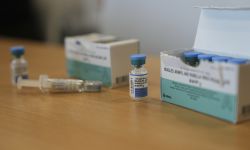Michigan study: Hydroxychloroquine saved lives among coronavirus patients

Early treatment with hydroxychloroquine cut the death rate significantly in certain sick patients hospitalized with COVID-19 — and without heart-related side-effects, according to a new study published by Henry Ford Health System.
The study, published Thursday in the International Journal of Infectious Diseases, is another curve in the continued research — and its sometimes conflicting results — into whether the drug that seemed promising at the beginning of the COVID-19 pandemic really works.
The Henry Ford study examined outcomes of 2,541 patients hospitalized with COVID-19 between March 10 and May 2 across the Michigan system’s six hospitals. Overall, 18 percent of the patients died in the hospital.
But there were marked differences in their treatment.
Among those who received hydroxychloroquine as part of early treatment, 13 percent died, compared to 26 percent of those who did not receive the drug.
- The latest: Michigan coronavirus unemployment, map, curve, updated COVID-19 news
- Dashboard: Michigan coronavirus testing numbers, trends, COVID-19 data
Mortality among all patients was highest among those who were older than 65, white, and were admitted with already-reduced oxygen levels. They also commonly had serious underlying diseases, including chronic kidney and lung disease.
Dr. Marcus Zervos, head of infectious disease at Henry Ford Health System, acknowledged that Henry Ford’s results differ from other studies.
“There’s variability in the literature on outcomes with hydroxychloroquine... What we think was important in our study was our patients were treated early. And for hydroxychloroquine to have a benefit, it needs to be given before the patient suffers some of the severe immune reaction that can occur with COVID.”
That’s because the drug works by inhibiting the immune system’s inflammatory response to the virus, Zervos said.
Stories from the front
Bridge Magazine, Detroit Free Press and Michigan Radio are teaming up to report on Michigan hospitals during the coronavirus pandemic. We will be sharing accounts of the challenges doctors, nurses and other hospital personnel face as they work to treat patients and save lives. If you work in a Michigan hospital, we would love to hear from you. You can contact reporters Robin Erb rerb@bridgemi.com at Bridge, Kristen Jordan Shamus kshamus@freepress.com at the Free Press and Kate Wells katwells@umich.edu at Michigan Radio.
Patients were monitored for possible heart issues, he added, and anyone who was at risk for cardiac abnormalities was excluded from the study.
While it is critical to use hydroxychloroquine in combination with other treatments, such as steroids, Zervos said these findings suggest the drug could be helpful in treating COVID, especially in other countries that don’t have access to the antiviral drug, Remdesiver, which may reduce illness in some COVID-19 patients.
“Many of these countries, they could be low-income settings. They don’t have access to Remdesivir. Remdesivir is going to be expensive. Hydroxychloroquine is inexpensive. So I think the drug does have a role,” Zerovos said.
Hydroxychloroquine, sold as a generic or under the brand name Plaquenil, is used to prevent or treat mosquito-carried malaria, as well as certain auto-immune diseases such as lupus and arthritis.
In the earliest days of the pandemic, doctors reported that some patients appeared to recover more quickly with hydroxychloroquine. The drug’s profile skyrocketed in March after Tesla CEO Elon Musk tweeted a reference, and President Trump lauded its potential as a game-changing medication and urged patients to give it a shot.
But scientists quickly urged caution as doctors began to report potentially deadly changes to the heart’s rhythm. In April, the U.S. Food and Drug Administration warned against use of the drug outside a closely-monitored hospital setting or clinical trial. Then last month, the FDA withdrew hydroxychloroquine sulfate and the related chloroquine phosphate from the Strategic National Stockpile for use among hospitalized COVID-19 patients.
Confusing matters more, two high-profile studies — including one that suggested hydroxychloroquine was unsafe — were retracted from the respected journals, The New England Journal of Medicine and The Lancet, after researchers questioned irregularities in the data.
A study to determine whether hydroxychloroquine may prevent COVID-19 infection is also underway at Henry Ford. The randomized, double-blinded WHIP study will examine 3,000 first responders and health care workers. There are 619 people currently enrolled.
See what new members are saying about why they donated to Bridge Michigan:
- “In order for this information to be accurate and unbiased it must be underwritten by its readers, not by special interests.” - Larry S.
- “Not many other media sources report on the topics Bridge does.” - Susan B.
- “Your journalism is outstanding and rare these days.” - Mark S.
If you want to ensure the future of nonpartisan, nonprofit Michigan journalism, please become a member today. You, too, will be asked why you donated and maybe we'll feature your quote next time!








